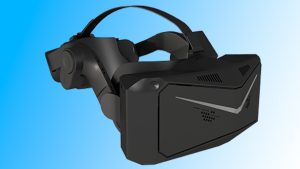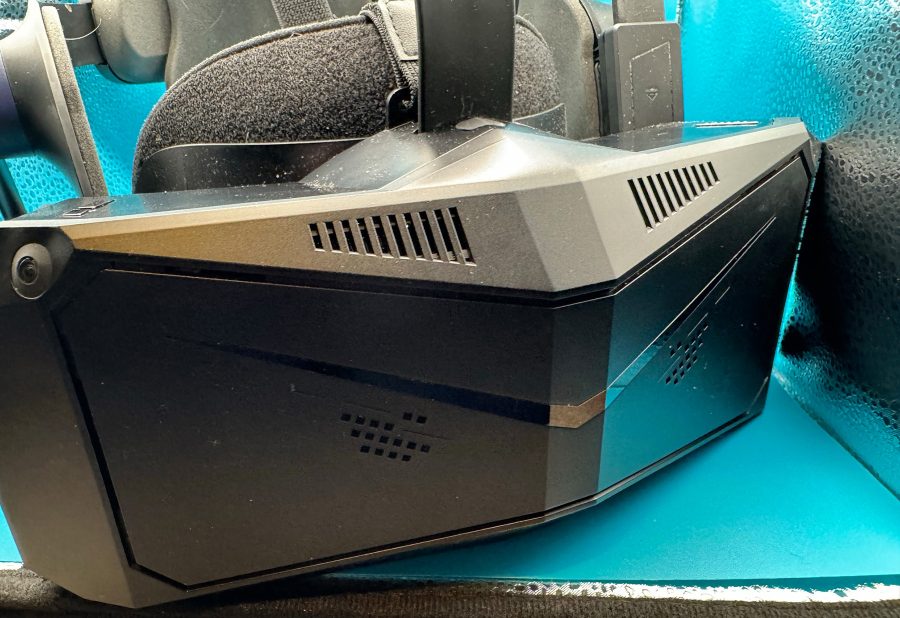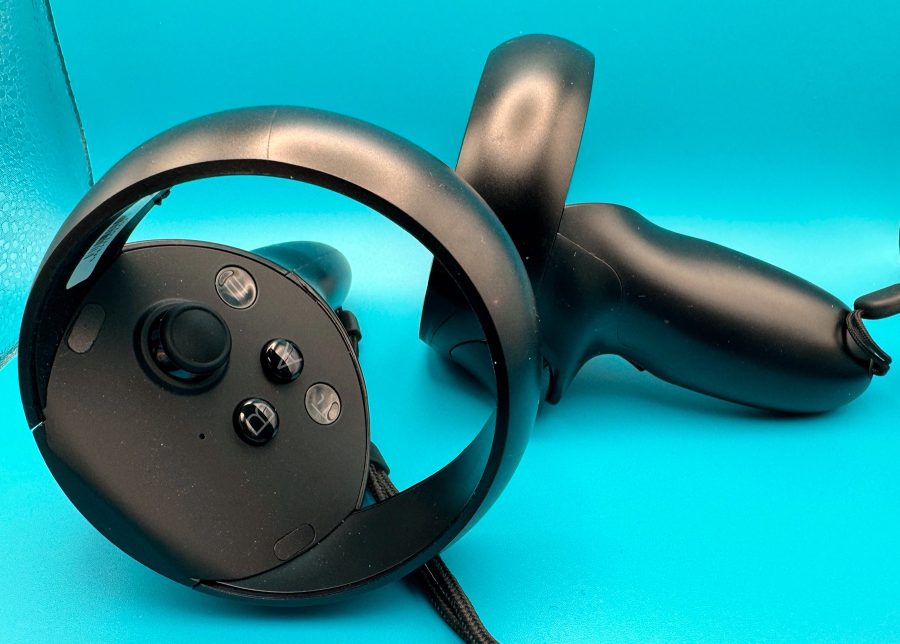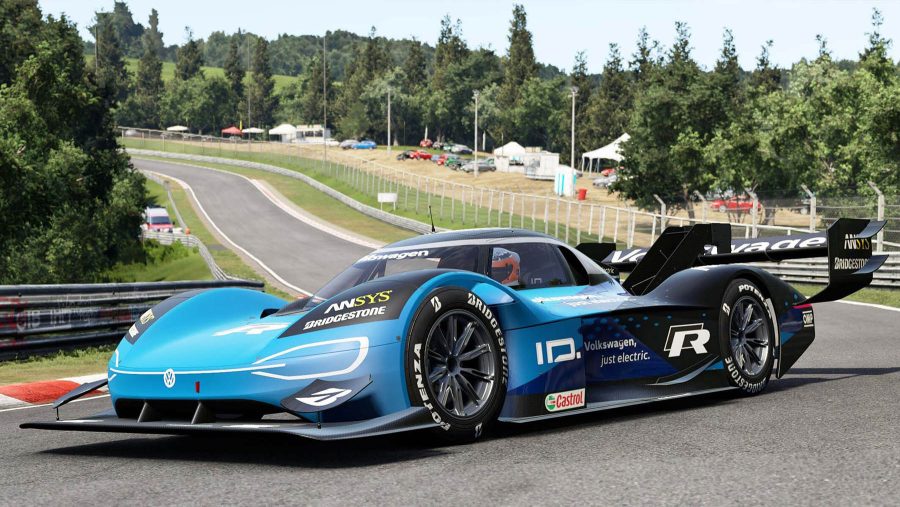- Home
- Features
- Business
- Active
- Sports
- Shop
Top Insights


Many won’t remember the days before the Meta Quest when the only option for VR was to attach a fistful of cables to our PCs straining US ports and hope we didn’t accidentally punch through our monitors during a stressful game of Beat Saber.
Back in those days when I was happily playing on my Oculus Rift DK2 and then later my Oculus Rift, the majority of my experiences were seated ones. I did not have the room for room-scale. What I did have was a nice comfortable gaming chair, a stand for my racing wheel and pedals, and DIY’d chair arms that had my HOTAS attached.
It was as close as I was getting to my own sim pit and it was amazing. After hundreds of hours in flight sims, space sims such as Elite Dangerous, and race games such as Assetto Corsa, iRacing, and Project Cars I couldn’t see any other way to play games other than in VR.
Then we moved house and I never got around to setting it all up again, I almost did. I can still see my Oculus Rift in the corner and I still have the sensors attached to the roof, but life took over and everybody started buying Quests to get away from behind tethered. And while the Quest 3 is a terrific headset that finally lets me at least play some sim experiences via its Air Link streaming set-up it is not an out-and-out PCVR headset, it is all a bit of a bodge.
Pimax Crystal – A VR headset for sim enthusiasts
Step forward the Crystal from Pimax – a headset that would not look out of place on a Cylon overlord. The Crystal comes with a familiar rats nest of cabling and a long DisplayPort cable that I need to fiddle around the back of my PC to fit in, removing one of my three monitors (Yes, I do need them all thanks!). Ah, I remember these shenanigans.
The Pimax Crystal comes in a box that is much larger than Meta’s offering and upon opening it you can see why, the headset is huge in comparison, but it has to be to hold the giant electronic goodness it comes packed with, more of this later.
Fishing around in the rest of the box you will find cables, batteries, and a USB hub to enable easy connection. Gone are the days when I had to buy an extra USB PCi card to plug my Rift in thankfully.

On liberating it from its nice packaging, firstly it is noticeable that the Crystal, while probably the heaviest headset I have felt is not actually as heavy as I expected, secondly I massively approve of the proper strap the unit comes with. It feels well-built and secure on your face and tightening the dial at the back reveals that everything is nicely balanced. I wouldn’t want to jump around with it on more than I would with any other plastic box strapped to my face, but as this is going to be used for simming, it feels okay.
A quick download of Pimax’s previously much-maligned (on the internet at least) operating software. It installs quickly enough and sets about talking me through the setup, what to plug in where, what goes in the USB hub, and what needs to go into the back of my rig – a single DP cable and one USB connector. With that done I sit back and wait for the connection. Nothing. A quick check revealed some user error and I have the wrong side of the hub from the instructions connected to my PC. I chuckle to myself remembering VR of old. Swap it all around still nothing which was more odd.
I then plugged it into a port on the back of my machine rather than the front (I was previously being lazy) and it fires into life. I assume there is not enough power if it is not directly into my motherboard, on my setup at least.

I can now see the Crystal is connected so spending a little time in the software I soon have it showing my Oculus and Steam VR libraries which is a nice touch. Pimax does have its own limited app store so I downloaded the two free things I found on there and got an error saying I didn’t have enough disk space – I did so I left it. When I tried a couple of days later they downloaded fine, so I don’t know what was going on there – either way, I will realistically be using games I have got stored via Steam VR anyway).
The software has apparently undergone a lot of changes before I made acquaintance with it. The internet is rife with comments about how bad it is, but in the main, these are outdated, and while it isn’t up to Apple’s standard I found it quite usable, I also found a couple of features I love that can be turned on. Pimax openly admit that the software still needs more optimization, but to its credit, they are continuing to release new and better versions all the time.
Anyway, I’ll go over that in a second, on with the headset.
Pimax Crystal – the best VR headset image out there?
And this was the wow moment, from the second you hang the Crystal in front of your face you forgive it any little quirks of installation, wires you can fall over, and the slightly odd scenario where you have to have one of the two batteries in to use it even when connected to power. Let’s get this out of the way here, I have never seen consumer VR this clear. Now I understand why it is called the Crystal.
The dual 2880×2880 screens with a refresh rate of up to 120Mhz need a serious PC to drive them to their max, but if you have anything from the past couple of years, you are going to enjoy what you see before your eyes, presented on the Crystal’s actual glass lenses. There is no plastic here on the optics.
The field of view is larger than probably anything you have had before and Pimax is about to release some new lenses that make it even bigger. You will just be able to easily swap them out within minutes it seems.
The software options I toggled on earlier are great. On first putting the headset on it will make sure you have aligned it to your eyes properly. Hold still and it will sort all that out. Then you will hear it whir as the automatic IPD sensors adjust the space between the lenses to the correct amount for your eyes. No fiddling around with a dial here, although there is a manual option if you think you would rather use that. It’s a nice feature and removes the doubt that you may have gotten something wrong.

The menu system before you should now be showing your games and you can now select one with one of the Pimax controllers – if you ever had a Rift think of the initial ones you go with that with the big halo protecting your knuckles. These are tracked well enough, I have seen a lot of complaints about them as well but I didn’t really ever lose tracking, but I was in a well-lit room. Controllers have maybe moved on with what we get with the Quest 3, but again, I am using this headset for swimming and I certainly won’t be using VR controllers to play.
It is worth pointing out here that the Crystal tracks via cameras on the headset rather than base stations or Lighthouses, although can purchase (it’s not cheap) a new faceplate that would make use of your existing Valve Index Lighthouse sensors.
So from there, it is time to put the Crystal through its pace in a few sims.
SIMply the best
Apologies for the awful pun there. I couldn’t resist it. Having already seen how crisp the display was I couldn’t wait to boot up a game so I headed to Project Cars, a game I became very familiar with in my Rift days. Once booted into the menu I was able to use the Crystal’s excellent eye tracking to move the pointer which followed my gaze to the option I wanted and I could then just select it. Within less than a minute I was in my car, and again, just wow. Heading out onto a sunny track with no visible screendoor effect was closer than I have ever felt to this game. Pulling out of the pit lane and putting my foot down was, certainly at this stage of the technology, as close as I will ever be to the first corner. Getting over-excited I pushed it too far and spun off into the gravel on the second corner. As the wall approached my out-of-control vehicle faster than I would have liked I caught myself closing my eyes for a second as I braced for the impact. Gravel flew up, the sun glinted off my now stationary mirrors and it kind of made up my mind that I won’t be playing driving games in anything less than the Pimax Crystal again.

On-to-flight sims and having a look at both DCS World and Microsoft Flight Simulator to see if they bring with them similar results. From the second you land in the cockpit, there is something unique about just how clear things are and the increased field of view makes a huge difference to immersion. I struggled with frame rate a little more in flight sims than car racers and found myself tweaking down some of the settings. The default settings for the Crystal’s rendering in Steam VR are pretty hot and you can dial them back without affecting too much, but that extra legroom will give your GPU a bit more room to breathe while rendering the world both above and below you.
Conclusion
The Pimax Crystal is a serious piece of VR kit. It comes with a serious price and, it’s fair to say, a learning curve. A Meta Quest 3 it is not, but it is not trying to be. I am not sure how much fun you would have if you were setting this up as your first venture into VR but if you want to take your sim racing or flying to the next level that could be you. Persevere and you will be rewarded with a VR experience you probably cannot get anywhere else at this stage. It is that good.
The other thing that endears me to Pimax is how keen they seem to be to improve things. A recent software update introduced passthrough, using the tracking cameras as passthrough so you can see your surroundings via a Quest-esque double tap on your temple. These cams are only as good as the Quest 2 ones, black and white and grainy, even in good light, but I am sure they will improve with later updates. Also, because the Crystal isn’t really designed to thrash around in you will generally be seated so a high-fidelity passthrough camera becomes much less important.
We will be looking at the Crystal and its use cases for other things in the near future, how it stacks up against the competition out there such as the Quest 3 and the Apple Vision Pro, but for now we wanted to to test it out for what we think is it’s best aspects. We haven’t even touched here about how the Crystal can be used standalone without even a PC. We simply do not have the space to cover it all in one article, so we are remain concentrated on this particular niche.
For all the hoops you may have to jump through the Pimax Crystal is the best VR headset I have used for sim racing and flying in. It is worth the effort, the occasional frustration, and the rare disconnect. I still don’t really understand the battery scenario which seems to drain even when I think it’s turned off so I always keep the second charged and ready.
The technology inside this large unit is amazing and brings immersion closer than I thought was possible at the moment. There is no screen door effect and while the sweet spot for clarity could be bigger when you are sim racing or flying, you don’t seem to notice any slight blur on the periphery because you are concentrating on what is ahead of you most of the time, so it all just works.
Is it worth the $1500 asking price when you could easily get an excellent ultrawide monitor for that price? I think to ask that question is to kind of miss the point, I want to feel like I am in an F1 car or a Cessna light aircraft. I want to look at the dials like they are in front of me, and with the Crystal for the first time in VR I can see them and almost believe they are there. It’s that good.
So if you are serious about VR or sim games and have the cash, then yes it is worth it. And hopefully, as the months pass the software will continue to improve and the user experience will become as polished as the one Meta offers, just with more wires to trip over.
The post The Pimax Crystal – is it the best VR headset for sim gaming? appeared first on ReadWrite.
Recent Posts
Categories
Related Articles
Samsung's Discover Spring sale event kicks off today, and you can save...
ByglobalreutersMarch 3, 2025The reported policy shift comes as the U.S. government signals a change...
ByglobalreutersMarch 3, 2025



Leave a comment